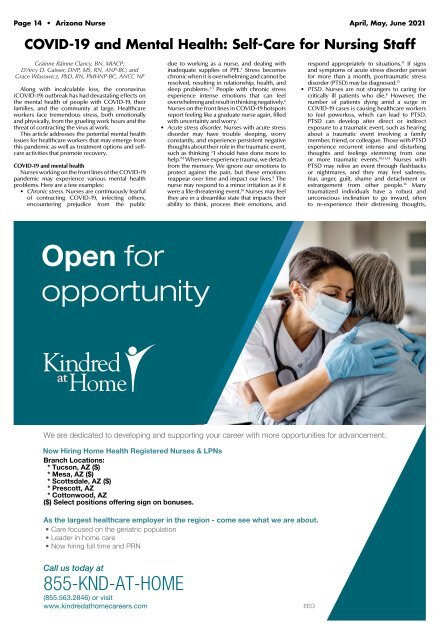Arizona Nurse - April 2021
- No tags were found...
Create successful ePaper yourself
Turn your PDF publications into a flip-book with our unique Google optimized e-Paper software.
Page 14 • <strong>Arizona</strong> <strong>Nurse</strong> <strong>April</strong>, May, June <strong>2021</strong><br />
COVID-19 and Mental Health: Self-Care for Nursing Staff<br />
Gráinne Ráinne Clancy, BN, MIACP;<br />
D’Arcy D. Gaisser, DNP, MS, RN, ANP-BC; and<br />
Grace Wlasowicz, PhD, RN, PMHNP-BC, ANCC NP<br />
Along with incalculable loss, the coronavirus<br />
(COVID-19) outbreak has had devastating effects on<br />
the mental health of people with COVID-19, their<br />
families, and the community at large. Healthcare<br />
workers face tremendous stress, both emotionally<br />
and physically, from the grueling work hours and the<br />
threat of contracting the virus at work.<br />
This article addresses the potential mental health<br />
issues for healthcare workers that may emerge from<br />
this pandemic as well as treatment options and selfcare<br />
activities that promote recovery.<br />
COVID-19 and mental health<br />
<strong>Nurse</strong>s working on the front lines of the COVID-19<br />
pandemic may experience various mental health<br />
problems. Here are a few examples:<br />
• Chronic stress. <strong>Nurse</strong>s are continuously fearful<br />
of contracting COVID-19, infecting others,<br />
encountering prejudice from the public<br />
due to working as a nurse, and dealing with<br />
inadequate supplies of PPE. 1 Stress becomes<br />
chronic when it is overwhelming and cannot be<br />
resolved, resulting in relationship, health, and<br />
sleep problems. 2-5 People with chronic stress<br />
experience intense emotions that can feel<br />
overwhelming and result in thinking negatively. 6<br />
<strong>Nurse</strong>s on the front lines in COVID-19 hotspots<br />
report feeling like a graduate nurse again, filled<br />
with uncertainty and worry. 7<br />
• Acute stress disorder. <strong>Nurse</strong>s with acute stress<br />
disorder may have trouble sleeping, worry<br />
constantly, and experience persistent negative<br />
thoughts about their role in the traumatic event,<br />
such as thinking “I should have done more to<br />
help.” 8 When we experience trauma, we detach<br />
from the memory. We ignore our emotions to<br />
protect against the pain, but these emotions<br />
reappear over time and impact our lives. 9 The<br />
nurse may respond to a minor irritation as if it<br />
were a life-threatening event. 10 <strong>Nurse</strong>s may feel<br />
they are in a dreamlike state that impacts their<br />
ability to think, process their emotions, and<br />
respond appropriately to situations. 11 If signs<br />
and symptoms of acute stress disorder persist<br />
for more than a month, posttraumatic stress<br />
disorder (PTSD) may be diagnosed. 12<br />
• PTSD. <strong>Nurse</strong>s are not strangers to caring for<br />
critically ill patients who die. 8 However, the<br />
number of patients dying amid a surge in<br />
COVID-19 cases is causing healthcare workers<br />
to feel powerless, which can lead to PTSD.<br />
PTSD can develop after direct or indirect<br />
exposure to a traumatic event, such as hearing<br />
about a traumatic event involving a family<br />
member, friend, or colleague. Those with PTSD<br />
experience recurrent intense and disturbing<br />
thoughts and feelings stemming from one<br />
or more traumatic events. 10,13,14 <strong>Nurse</strong>s with<br />
PTSD may relive an event through flashbacks<br />
or nightmares, and they may feel sadness,<br />
fear, anger, guilt, shame and detachment or<br />
estrangement from other people. 14 Many<br />
traumatized individuals have a robust and<br />
unconscious inclination to go inward, often<br />
to re-experience their distressing thoughts,

















